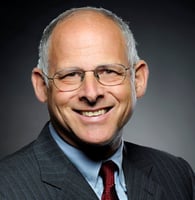The COVID-19 pandemic has revealed serious deficiencies of our healthcare system that has placed many organizations at risk. We now have an opportunity to reformulate and accelerate our clinical and business strategy to prevent such vulnerabilities in the future. This webinar presented by Dr. Jon Burroughs, MD, MBA, FACHE, FACPE, certified healthcare and physician executive, and a leading voice for the healthcare industry in the areas of physician–hospital alignment, performance/patient safety, and strategic planning, covers the systemic issues that were uncovered during the pandemic and how we as an industry can build a more solid strategic foundation that will help us to weather pandemics going forward without sacrificing our greater mission to support the healthcare of those whom we serve.
Key Learnings from COVID-19:
Charting a New Strategy
Presenter: Dr. Jon Burroughs, MD, MBA
Date: June 23rd, 2020
Q & A with Dr. Burroughs:
1. A doctor friend (specialist) is always complaining that so much of his overhead goes to the varying requirements of multiple insurance companies. This seems like a major problem in streamlining healthcare. Could you comment?
This is a part of the non-value-added cost that must be eliminated which is why so many healthcare systems are vertically integrating an insurance product so as to eliminate unnecessary variation and cost. We no long have the luxury of servicing multiple commercial payers (along with the usual Medicare and Medicaid) and must streamline costs and efficiencies to optimize value.
2. The Primary Care "model" may have changed but you still see the importance of Primary Care righting the cost curve?
The three major issues with traditional primary care is: the wrong person doing the wrong job, lack of risk and severity adjustment, and lack of professional documentation and coding. Physicians should be overseeing and managing primary care and not providing the majority of services and should be paid for managing large numbers of covered lives (that are risk and severity adjusted). The documentation and coding components require certified coders at the point of care documenting all co-morbidities and non-clinical determinants of care in real time. This model also requires appropriate value-based payment models that rewards your system for optimizing quality, complexity, severity, and lowering costs.
3. So many deaths seem to be from 'lifestyle' illnesses... will the healthcare system seek to do more actual healthcare (preventative & education) versus sick care?
This is the primary reason why we need to move from a ‘sickness’ (fee for service) delivery model to a ‘health’ (value) delivery and business model. Only then will we be appropriately compensated for keeping a population of covered lives healthy (or ideally optimizing their healthcare). Proper incentives are key!
4. My providers used telemed/telehealth while reimbursements were equal to an in-office visit. If reimbursement is going to be reduced, my providers no longer want to do it. Our specialty is orthopedics. Any suggestions?
The problem is the ‘fee for service’ model. Move towards a risk based capitation system where you get a risk and severity adjusted PM payment for orthopedic ‘covered lives’ and the payer won’t care about your delivery model and your physicians will be incentivized to reduce operating costs. Everyone will win.
5. What is your recommendation on how to implement this new strategy to virtual and value based care and stay afloat?
A key business tool that is increasingly used is modeling or simulation analytics through which you can literally run the numbers and calculate a predicted return on investment (ROI) and hurdle rate or rate of return for different business strategies before you commit to risk. I strongly recommend that you speak with one of the big three (IBM-Truvent, Vizient, Premier) or other analytics organizations to determine an analytic tool that will help you and your organization to reduce the relative risk of having to balance and prioritize so many innovative business strategies.
6. Is the healthcare "education" system (DRs/Nurses, etc) changing to reflect this new trajectory? How?
The short answer is not quickly enough. Several healthcare systems (e.g. Mayo Clinic and Geisinger) have become so frustrated by the entrenched medical education systems that they have built their own medical schools to prepare 21st century healers to both provide and manage healthcare. It is important that healthcare executives provide feedback to Medical School Deans regarding your needs for a vibrant and relevant 21st century medical staff.
For more TLD Group resources for navigating the challenging waters created by the COVID-19 pandemic visit the
Crisis Leadership Support Center
 Dr. Jon Burroughs, MD, MBA, FACHE, FACPE
Dr. Jon Burroughs, MD, MBA, FACHE, FACPE
Jonathan H. Burroughs, MD, MBA, FACHE, FACPE is President and CEO of The Burroughs Healthcare Consulting Network, Inc. and works with some of the nation’s top healthcare consulting organizations to provide ‘best practice’ solutions and training to healthcare organizations throughout the country in the areas of governance, physician–hospital alignment strategies, credentialing, privileging, peer review and performance improvement/patient safety, medical staff development planning, strategic planning, physician performance and behavior management as well as ways in which physicians and management can work together in new ways to solve quality, safety, operational, and financial challenges.
Dr. Burroughs serves on the national faculty of the American College of Healthcare Executives and the American College of Physician Executives, where he has been consistently rated as one of their top speakers and educators. Dr. Burroughs received his bachelor’s degree at Johns Hopkins University, his MD from Case Western Reserve University, and a healthcare MBA with honors at the Isenberg School of Management. He is a certified healthcare and physician executive and is a fellow of the American College of Healthcare Executives and the American College of Physician Executives.
Select



